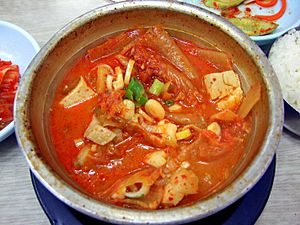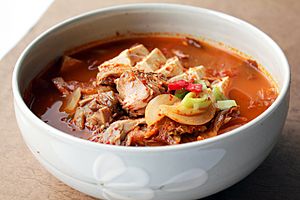Kimchi-jjigae facts for kids
 |
|
| Alternative names | Kimchi stew |
|---|---|
| Type | Jjigae |
| Place of origin | Korea |
| Main ingredients | Kimchi |
| Korean name | |
| Hangul |
김치찌개
|
|---|---|
| Revised Romanization | gimchi-jjigae |
| McCune–Reischauer | kimch'i-tchigae |
| IPA | [kim.tɕʰi.t͈ɕi.ɡɛ̝] |
Kimchi-jjigae (김치찌개), also known as kimchi stew, is a super popular Korean dish. It's a type of stew called jjigae. This yummy stew is made mainly with kimchi. Other ingredients like pork or seafood, scallions, onions, and tofu are often added. It's one of the most common and loved stews in Korea.
Contents
The Story of Kimchi-jjigae
Kimchi has been around for a very long time. Before the Joseon era, it was a pickled vegetable dish that wasn't spicy. Chili peppers came to Korea in the middle of the Joseon era. That's when the spicy kimchi we know today was created. People believe that kimchi-jjigae also started to be made around this time.
How Kimchi-jjigae is Made and Eaten
Cooking with Kimchi
The flavor of kimchi gets stronger as it gets older. This is why kimchi-jjigae is often made with older, more fermented kimchi. This kind of kimchi has a much deeper flavor. It also contains good bacteria called probiotics. Keep in mind that these living bacteria won't survive the cooking process. Since kimchi is the main part of kimchi-jjigae, other ingredients can be changed based on what you like.
Common Ingredients and Steps
First, sliced kimchi is put into a pot. Then, you add your choice of meat, like pork or beef. Other common ingredients include tofu, sliced green onions, and garlic. These ingredients are then cooked in water or a special anchovy broth. The stew gets its flavor from fermented bean paste (doenjang) or spicy red pepper paste (gochujang).
Serving it Up
Like many Korean dishes, kimchi-jjigae is usually shared. If more than two people are eating, it's often placed in the middle of the table. It comes with traditional side dishes called banchan and a bowl of rice. This stew is usually cooked and served bubbling hot in a stone pot.
Different Kinds of Kimchi-jjigae
While beef, pork, or chicken are common, there are also special types of kimchi-jjigae.
Tuna Kimchi-jjigae
Chamchi kimchi-jjigae (참치 김치찌개) is made with tuna. This tuna usually comes in a can and is made especially for stews. It's a popular choice for camping trips or picnics. This is because it's easy to cook and carry around.
Pacific Saury Kimchi-jjigae
Ggongchi kimchi-jjigae (꽁치 김치찌개) is made using a type of fish called Pacific saury.
Budae-jjigae (Army Base Stew)
Budae jjigae (부대찌개) is a unique version. It's made by cooking kimchi with ingredients that aren't usually found in Korean food. These can include Spam, hot dogs, and slices of American cheese. The word Budae means "army base" in Korean. This stew first appeared during the Korean War. At that time, South Koreans used extra ingredients they got from the US military.
See also
 In Spanish: Kimchi jjigae para niños
In Spanish: Kimchi jjigae para niños
 | Emma Amos |
 | Edward Mitchell Bannister |
 | Larry D. Alexander |
 | Ernie Barnes |


